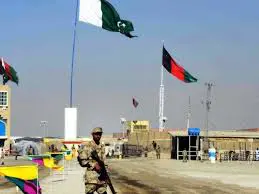Pakistan enforced a new mechanism on one of its busiest border crossing points with Afghanistan last week that requires every Afghan to carry legal travel documents for entering the country.
People living near the border areas on both sides could have previously crossed the border without any documents. Pakistani officials, however, argue that the unchecked cross-border movement has created a serious security threat as militants are mingling with the locals to cross the border for "terrorist activities."
As the cross-border movement by the militants had always been a major irritant to bilateral relations, there was an urgent need for a better border control system to stop the movement of the militants. Observers maintain however that there is a need for both countries to develop and reach a consensus on the issue, as both countries face the threat of terrorism.
The Afghan ambassador to Islamabad, Omar Zakhilwal, has said Afghanistan "is as yet not confident about the new measures with respect to the visa requirements for all travelers trough Torkham and other crossing points from Afghanistan."
For his part, Pakistan Foreign Ministry Spokesman Nafees Zikriya has defended the decision and said "effective border management is part of our counter-terrorism efforts, which is in the interest of both countries."
He told reporters last week that border management was "vital for checking infiltrations across the long and porous Pakistan-Afghanistan border."
Pakistan and Afghanistan share a 2,600 km common border, mostly porous, and the militants take advantage of the unchecked and undocumented cross-border movement.
Pakistan embassy spokesman in Kabul Akhtar Munir told Xinhua recently that the embassy and four Pakistani consulates in Afghanistan issue between 1,800 to 2,000 visas daily to Afghan nationals but 20,000 to 25,000 people daily enter Pakistan through Torkham alone, the majority without any travel documents.
He said investigations have suggested that the militants, who carried out major attacks in Pakistan, including the Bach Khan University in January this year, an assault on an air force base near Peshawar last year, and the deadliest terrorist attack on the army public school in December 2014, crossed the Torkham border to enter Pakistan.
The spokesman's remarks reflect the growing sensitivity of the issue that requires the attention of both terrorist-hit countries to agree on such a mechanism to address the issue of illegal border crossing.
Whatever the gravity of the situation might have been, any decision should be made bilaterally as both countries have been badly affected by violent extremism and terrorism.
Some developments including a lack of progress on the peace process have caused tensions between Pakistan and Afghanistan, so the issue of border management should not cause more differences as bilateral cooperation is essential now, more than ever, to deal with common challenges, political watchers have said.
Border monitoring mechanisms are also essential to stop the crossing into Afghanistan of miscreants from the Pakistani side of the border.
Afghanistan has long-been complaining about the entry of the militants from this side of the border.
Independent political commentators have also advised both the neighboring countries to focus on some sort of a border control mechanism to effectively address the issue of illegal crossings, as this is seen as vital to strengthening mutual security.
A former Pakistani military officer, Syed Nazeer, is not averse to a border management system, but is calling for such an approach to be gradually introduced.
"I think Pakistan should not impose abrupt restrictions unilaterally. Any decision should be bilateral as both sides have the responsibility to secure their common border," Nazeer, a retired Pakistan army brigadier, told Xinhua on Sunday. He suggested travel incentives for those who are settled in the border areas on both sides.
Former Pakistani ambassador to Afghanistan Rustam Shah Mohmand, tracing the history of the border agreement also known as the "DurandLine," said people living within 8 km on both sides of the border, should not require any documents to cross the border.
Mohmand, however, said that any country has the right to secure its border and introduce such a system to ensure that no unscrupulous elements exploit the laxness in security.
(APD)
 简体中文
简体中文

